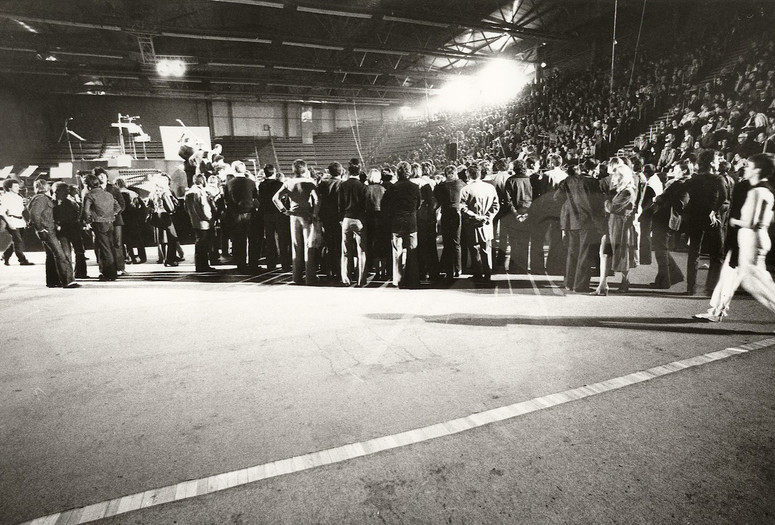
DocTalks is a series dedicated to ongoing investigations conducted by doctoral, postdoctoral, or early-career researchers about the expansive entanglement of architecture with the natural environment. These sessions are meant to create an intercollegiate cohort of scholars that workshop writing, share research findings, and experiment with methodological tools while engaging with the vision and investigations of the Ambasz Institute.
These Doc Talk sessions are intended for scholars or architecture history and theory, but scholars in related fields and the general public are welcome to attend.
Unfolding Spaces: Avant-Garde Environments, Experimental Choreography, and Politics of Space in Milana Broš and Dubravko Detoni’s La voix du silence at the 1973 Music Biennale Zagreb
Speaker
Marjana Krajač, Ohio State University
This paper investigates the intersection of the politics of space, experimental music, and improvisational choreography in Milana Broš and Dubravko Detoni’s La voix du silence, a site-specific performance created for the 1973 Music Biennale Zagreb. The paper examines La voix du silence as a specific environment of the avant-garde in Yugoslavia that activated public spaces through experiments in art, contributing to the development of the public sphere. As there are no archival recordings of it, the work is being reconstructed from fragments, peripheries, and memories, highlighting the relevance of choreographic traces as witnesses of spatial and political histories. La voix du silence was staged in 1973 as part of the experimental happening titled Carrousel II, which brought together a large number of music ensembles, along with its first part, Carrousel I. In 1977, the Biennale programmed a similar project titled Carrousel, a large-scale composition by Vinko Globokar, and in 1979, Urbofest, a program of site-specific happenings in experimental music across the city of Zagreb, curated by Nikša Gligo. By considering the relationship between public space and the avant-garde, this paper explores how the thinking space mobilized through experimental music and experiments in choreography expanded the possibilities of public spaces and their complex social encounters. Tracing the work’s contribution to the archives of experimental choreography and contemporary music in Yugoslavia, this paper examines La voix du silence as an example of avant-garde experiments that have the potential to inquire into current social and political issues, particularly those related to public spaces and their archival, architectural, and social ecologies.
Marjana Krajač is a dance studies scholar, choreographer, choreographic researcher, and PhD candidate in dance studies at Ohio State University. Her research focuses on the intersection of modernism, postmodernism, and contemporaneity in dance, with an emphasis on site, space, environment, text, media, and process. Her work explores the spatial histories and politics of space, as well as the concept of dance and its experiment. She has received a number of awards for her choreographic work, which examines symptoms, consequences, and temporalities of form. She has published in the International Journal of Performance Arts and Digital Media, Body, Space & Technology Journal, Performing Arts Journal Frakcija, Journal for Dance Inquiry Movements, and Movement Research Performance Journal, among others. Her research encompasses dance history, theory, and choreography in Central and Eastern Europe, architecture, urbanism, and environment, as well as continental philosophy and experimental film and media studies.
Respondent
TBA
Stage 1: The Search for Shared Materials Ecologies to Build Arts Collectives in Malaysia
Speaker
Clarissa Lim, The Chinese University of Hong Kong
Malaysian arts collectives sit in between a globalized call to enter the international art world and attending to the public on the ground (Becker 2008). Often engaging in community arts practice, collectives tend to their neighbours by offering shared civic spaces, a limited resource in many urban contexts. Typically housed in underused as-found spaces, a design process begins by looking for affordable materials, crafts people, and collective building for their community arts practice.
This paper begins by interrogating how we build arts collectives with civic space function using shared material resources. By being generous with time and space, the arts collectives are a testament to exploring relational modes of shared materials and lands, also known as tanah. A theoretical framework developed by Jatiwangi Art Factory, tanah refers to the shared soil and lands around us, but also building with and in relationship social relations. Art collectives have been sharing whispers, gossip and developing forms of tanah where there is a material lack. By developing a series of maps and interviews, this paper elucidates the first stage of any architectural project for an arts collective. To begin interrogating the sets of relationships between artisanal crafts people, material resources and a flexible time frame, a relational material practice is necessary (Latour and Yaneva 2017).
Tracing the human and non-human actors, this paper presents how tanah is practiced. By identifying how materials like hard timber are salvaged, given time to be crafted and treated by local artisans, before landing on site to prepare for construction, tanah elucidates a material ecology. By supplementing typical material procurement practices with placed-based networks of relations, arts collectives reinvigorate everyday commons of material cultures and develop a new stage one for many architectural projects.
Clarissa Kim is a cultural worker based in between Hong Kong and Kuala Lumpur via Penang. She is currently a PhD candidate at the School of Architecture and received the Hong Kong PhD Fellowship Scheme and the CUHK Vice-Chancellor’s PhD Scholarship. She has been selected as the 2022–23 Emerging Curator at the Canadian Centre for Architecture. Working in the interstices of visual culture, arts and architecture, her research reveals the urban influence of arts collectives in Malaysia.
Respondent
TBA
This series was made possible through a generous gift from Emilio Ambasz. The Emilio Ambasz Institute for the Joint Study of the Built and the Natural Environment is a platform for fostering dialogue, promoting conversation, and facilitating research about the relationship between the built and natural environment, with the aim of making the interaction between architecture and ecology visible and accessible to the wider public while highlighting the urgent need for an ecological recalibration.